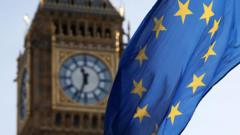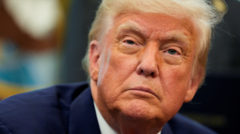As the UK and EU prepare for a pivotal summit to redefine their relationship post-Brexit, leaders are emphasizing cooperation and security amidst a backdrop of American foreign policy shifts.
Rebuilding Bridges: UK and EU on a Path to Cooperation

Rebuilding Bridges: UK and EU on a Path to Cooperation
In a historic summit, British and European leaders seek to strengthen ties and forge new agreements amidst changing global dynamics.
Amidst geopolitical uncertainty, Britain and the EU are gearing up for a landmark summit on Monday in London, aimed at rebuilding relations strained by Brexit. Five years after the UK’s departure from the Union, the event is expected to herald a new chapter of collaboration, particularly focused on defense and military security in Europe.
The ongoing decline in U.S. commitment to European defense has spurred these nations to explore a defense pact, alongside discussions on easing trade restrictions on food and enhancing energy partnerships. While the leaders are optimistic about progress, negotiations have highlighted ongoing challenges, particularly surrounding fishing rights and youth mobility agreements.
The overarching narrative remains clear: leaders are striving to navigate a complex global landscape shaped increasingly by a pullback of traditional U.S. leadership, specifically under President Trump. His administration has urged Europe to assume greater responsibility for its defense, reducing direct U.S. involvement and complicating diplomatic relations across the board, including with Russia.
As Britain and the EU seek to forge a new path, this summit will be crucial in determining how both sides can cooperate effectively in the face of shifting geopolitical dynamics and an evolving commitment from the U.S.
The ongoing decline in U.S. commitment to European defense has spurred these nations to explore a defense pact, alongside discussions on easing trade restrictions on food and enhancing energy partnerships. While the leaders are optimistic about progress, negotiations have highlighted ongoing challenges, particularly surrounding fishing rights and youth mobility agreements.
The overarching narrative remains clear: leaders are striving to navigate a complex global landscape shaped increasingly by a pullback of traditional U.S. leadership, specifically under President Trump. His administration has urged Europe to assume greater responsibility for its defense, reducing direct U.S. involvement and complicating diplomatic relations across the board, including with Russia.
As Britain and the EU seek to forge a new path, this summit will be crucial in determining how both sides can cooperate effectively in the face of shifting geopolitical dynamics and an evolving commitment from the U.S.




















